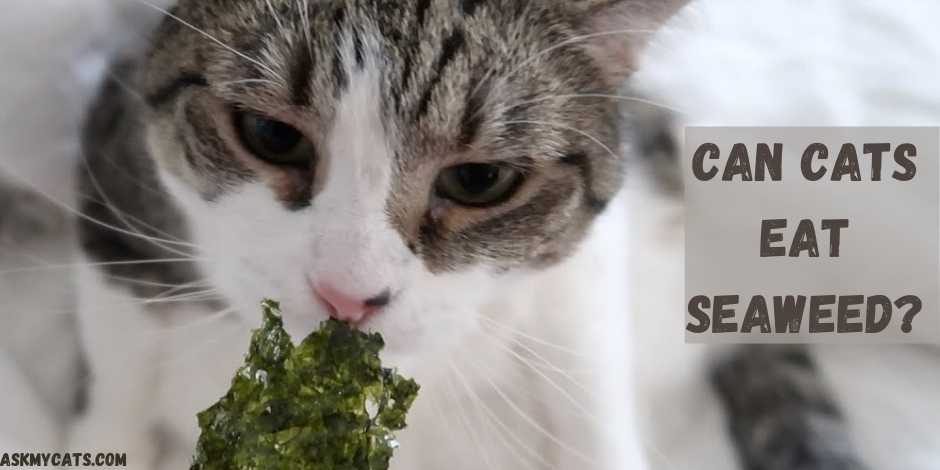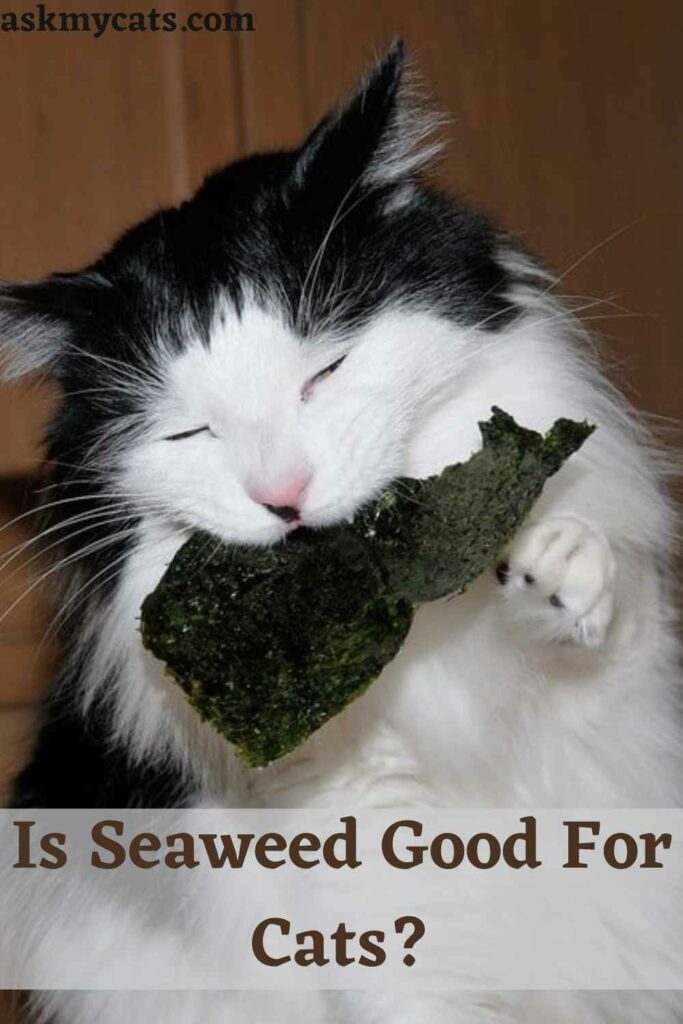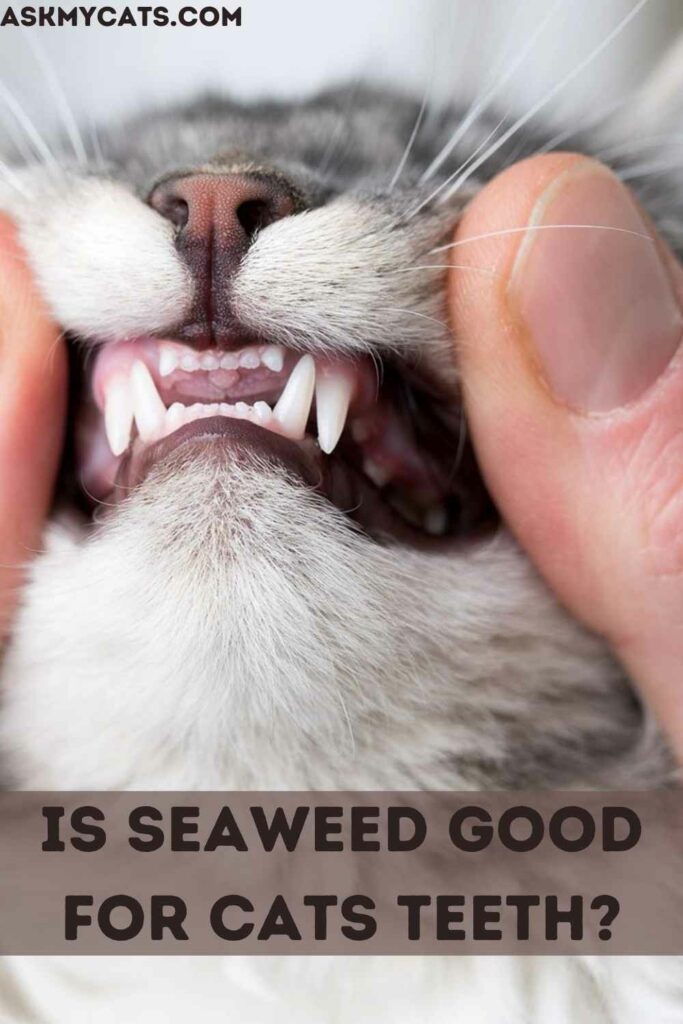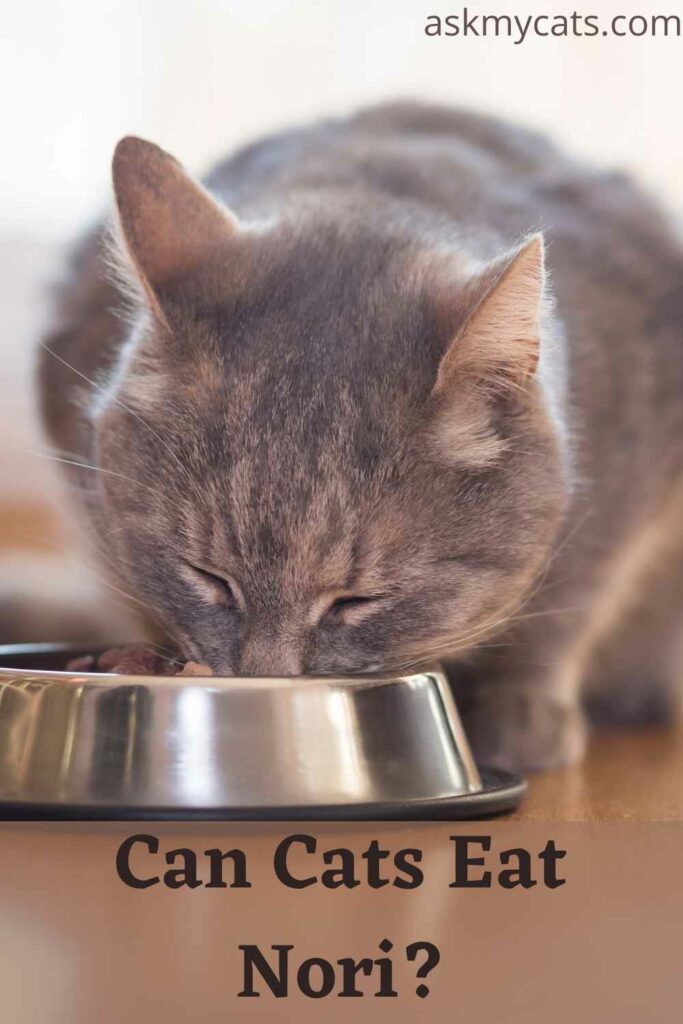Seaweed may not be the most appealing food, as it is basically slimy seafloor flora, but it is tasty and jam-packed with healthy nutrients for humans. You may have wondered at some point in time, “can my cat eat seaweed”?
Seaweed is safe for cats to eat. Seaweed is an excellent supplement to your cat’s diet. While cats can safely eat a variety of human foods, they often do not receive any nutritional benefits. Seaweed, on the other hand, is one of the few human foods that can actually help your cat thrive.
This article will talk about all the things you need to keep in mind before giving your cat seaweed and its benefits to your cat.


Give Your Cat the Perfect Day
Get the Free Ebook!
Is Seaweed Good For Cats?
Yes, seaweed is good for cats as it can help cats with a sensitive stomach, provide a boost to your cat, help with itchy skin and lack of fiber in cats.

1. Sensitive Stomach
Allergies can also impact the digestive tract of our pets.
Seaweed is easier to digest for pets, and it may help firm their stool, regulate their digestion, and enhance their metabolism.
Consult your veterinarian about adding seaweed to your pet’s food if he suffers from stomach sensitivity.
2.Boost
Blueberries, carrots, parsley, cranberries, pomegranate seeds are among the components present in Cat food, and with the addition of seaweed, it could be made even more beneficial for your cat.
Seaweed, like these fruits and vegetables, is high in antioxidants, making Cat food a nutrient-dense snack.
Antioxidants promote heart health, which extends life and reduces the chance of infection.
3. Helps With Itchy Skin
Allergies affect a large number of pets. Feeding a diet that contains seaweed and is recognized for its soothing skin and lustrous coat features may aid your pet even more.
Seaweed-based cat food may help reduce skin dryness, redness, and irritation.
It should go without saying that eating good makes you feel better. Seaweed is regarded as a superfood because of the numerous health benefits it provides to our cats.
4. Fiber
What has anti-inflammatory, anti-tumor, and anti-rheumatic characteristics, as well as promoting good bowel movements? Fiber is the answer, a nutrient that both humans and pets require.
A regular intake of fiber, which can be found in seaweed, is essential for intestinal health. Seaweed also contains prebiotics, which aids in the maintenance of beneficial bacteria in the gut.
Is Seaweed Good For Cats Teeth?
Yes, seaweed is good for cats teeth as it contains Ascophyllum nodosum, which is used for dental care.

Ascophyllum nodosum is a common ingredient in canine and feline dental treatment.
Because of an enzyme called Bacillus licheniformis, seaweed is healthy for your teeth.
By removing germs from plaque, the enzyme helps to prevent tooth decay.
The only species in the genus Ascophyllum is Ascophyllum nodosum, a huge, common cold-water seaweed or brown alga in the Fucaceae family.
It is also known as feamainn bhui, rockweed, Norwegian kelp, knotted kelp, knotted wrack, or egg wrack and grows as a seaweed in the North Atlantic Ocean.
Adding a seaweed supplement to your cat’s food each night can help to prevent plaque from forming on their teeth.
Seaweed contains Ascophyllum nodosum, a kelp species that naturally keep your pet’s teeth clean and reduces foul breath.
Ascophyllum nodosum is a type of brown seaweed that has been specifically chosen for its potential to remove plaque, tartar, and bad breath.
It contains bioactives, including Fucoidans and Polyphenols, which are absorbed systemically into body tissues and have been clinically demonstrated to reduce oral plaque and promote gum and tooth health.
Seaweed is one of the world’s most nutrient-dense and environmentally friendly crops.
In addition to being one of the richest sources of minerals and protein (amino acids), Seaweed has a number of health benefits, including anti-inflammatory properties, the ability to develop thicker, shinier coats, increased immunity and energy, and improved digestion.
Seaweeds are also high in Omega-3 fatty acids, particularly linolenic acid.
Thousands of veterinarians across the UK and Ireland endorse nutraplaque as an Ascophyllum nodosum seaweed supplement for your dog or cat.
After eight weeks, the specially selected Norwegian Seaweed in nutraplaque has been found to reduce plaque by up to 35 percent.
Nutraplaque is an all-natural product with a revolutionary double-action solution that works systemically to combat bad breath, tartar, and plaque for healthy teeth and gums.
Types Of Seaweed To Feed Your Cat
There are many types of seaweed you can feed to your cat some the most prominent ones are: –
- Acadian Sea Kelp- Kelp, often known as brown algae, is a type of seaweed found in cold water. It’s high in iron, calcium, protein, and magnesium, among other vitamins and nutrients. Kelp is a common ingredient in kitty supplements, and it can help your pet’s immunity.
- Irish Moss- Purple, green, brown, and red are just a few of the colors available for this form of algae. It can help your cat’s kidneys, bladder, and lungs to function properly.
- Nori- This roasted or dried seaweed is high in minerals, vitamins, and carbs, all contributing to a cat’s overall wellness. Nori also includes taurine, which may be beneficial to your cat’s heart.
- Dulse: Dulse is a green algae that is easy to digest for your cat. It contains cesium, a cancer-fighting element. Vitamin B12, iron, and beta-carotene are also present.
- Wakame: This seaweed includes fucoxanthin, which aids in the burning of fatty tissues in your pet. Apart from its anti-cancer properties, wakame can help cats avoid diabetes by regulating their metabolism.
- Kombu: Kombu, also known as horseshoe kelp, is high in protein, glutamic acid, and iodine. It is beneficial to your car’s liver, kidney, and stomach if you feed it to him sautéed, marinated, or roasted.
- Sea Lettuce: Sea lettuce, which is high in iron and cesium, can improve your cat’s digestive system. It also has an oyster flavor, making it a delicious treat for your pet.
How To Give Seaweed To Cat?
If you want to give seaweed to your cat, make sure that it is human-grade seaweed usually found in several health stores.
First and foremost, make sure you’re purchasing human-grade seaweed for your cat. Seaweeds that are healthy for people and cats can usually be found in health food stores.
Just make sure the seaweed you choose doesn’t contain any additional preservatives or seasonings by double-checking the label.
Also, for your cat, only buy simple seaweed, not seaweed that has been processed into snacks or chips and may contain seasonings.
Second, offer a small amount of seaweed to your cat. To begin, you might wish to cut some up and mix it in with their regular diet.
Also, keep in mind that seaweed is more of a supplement or a treat for your cat. Seaweed should not be the mainstay of any cat’s diet.
Can Cats Eat Seaweed With Salt?
No, it is not recommended to feed your cat seaweed with salt as salt can harm your cat resulting in vomiting, lethargy, and diarrhea.
Too much salt might be harmful to your cat’s health. Their electrolytes become unbalanced as a result of the salt, and their cells refuse to function properly.
Keep an eye out for signs of salt toxicity, such as stumbling, vomiting, diarrhea, and excessive thirst or urination.
If you don’t treat your pet within 24 hours, he could die, so take him to the vet right away if you think he’s had too much salt. The veterinarian can administer IV fluids and electrolyte balance.
A cat can acquire a condition called hypernatraemia, which is uncommon in healthy animals. This is also known as salt poisoning and refers to an excess of salt in the blood.
It’s unusual for a cat to get salt poisoning only from eating salty foods if it doesn’t have any underlying medical issues.
However, if a cat already has excessive amounts of salt in her blood due to a medical condition, adding more salt to the mix can only make matters worse.
The cat may go into a coma and die if the salt poisoning isn’t treated. Salt poisoning in cats necessitates the assistance of a veterinarian.
A course of intravenous fluids is usually required for the cat. If an underlying disorder causes hypernatraemia, it must be addressed as well.
Therefore you must always give seaweed to your cat without the addition of salt to rule out all of the above-mentioned scenarios.
Can Cats Eat Nori?
Yes, cats can eat nori without any problem if fed in moderation.

While it usually is not recommended for cats to eat food that isn’t intended for them, if your cat steals some nori from you or you offer it to them, it is entirely safe for them to eat.
Nori is a prominent sort of edible seaweed that is frequently used in Japanese cuisine.
Nori is a member of the Pyropia genus. Nori is a type of seaweed that is noted for its distinct flavor and health benefits.
Nori is usually offered in nori sheets, which are a batch of huge dried sheets.
Large chunks of nori that have been dried and cut into thin paper-like shapes are known as nori sheets.
Nori sheets are needed to make sushi because the nori is either on the outside or inside the sushi roll, depending on the type of sushi.
Nori sheets are often used to make onigiri, which is a form of rice ball with a filling inside.
Nori is a type of plant with a wide range of nutritional benefits. It’s high in vitamin A, vitamin C, and different kinds of vitamin B. In fact, just eating some Nori can provide you with far more vitamin A than you need on a daily basis.
Nori is also high in beneficial minerals like iron, iodine, and manganese. These vitamins and minerals are essential for your cat’s health, just as they are for you.
Health Benefits Of Feeding Nori To Cat
The benefits of feeding cat nori are that it helps metabolism and digestion and also firm up loose bowel movements.
Eating nori has a number of health advantages. Naturally, all vitamins and minerals are beneficial to humans.
While a cat’s nutritional requirements differ significantly from those of a human, your cat will benefit substantially from the vitamins, minerals, and amino acids present in Nori.
1. Metabolism And Digestion
However, there are a slew of other health benefits for cats who eat nori. Nori, for example, can aid their digestion and metabolism.
2. Firm Up Loose Bowel Movements
If your cat has very loose bowel movements, eating them nori can help them become firmer. Most importantly, nori can aid in the prevention of cancer in cats.
Frequently Asked Questions
Is there any health risk of feeding nori to a cat?
Ans. There are no health risks associated with providing your cat a moderate amount of nori on occasion. It’s possible to have too much of a good thing when it comes to healthful foods. Consider it a healthy treat for your cat from time to time, rather than attempting to put them on a nori-only diet. Your cat, like people, requires a well-balanced diet that provides them with all of the nutrients they need.
Can kittens eat seaweed?
Ans. Yes, kittens can eat seaweed. Age is irrelevant when it comes to this sort of stuff, and it would be a fantastic method for your young kitten to obtain some highly beneficial vitamins and minerals. These are vital for a kitten because they are growing and require a lot of healthy food to grow big and strong.
Can cats eat seaweed chips?
Ans. It is recommended not to feed your cat seaweed chips because of their high sodium content and other preservatives, which can make your cat ill.
Final Words
One thing to keep in mind when feeding seaweed to cats is that their bodies don’t need a lot of it to reap the full advantages.
What’s more important to remember is that high doses of iodine, which is prevalent in seaweed, can make cats hypersensitive.
Cats are prone to hyperthyroidism, a condition in which the thyroid gland produces an excess of hormones that can lead to a variety of health problems.
Though this does not imply you should avoid using seaweed, it does suggest you should use it sparingly. You’ll often obtain better results with seaweed-infused snacks or dental powders than with seaweed-infused food. A tiny bit of seaweed can help your cats make the most of the life they have if you follow cat feeding rules.
For any other questions, feel free to ask us in the comments down below.
